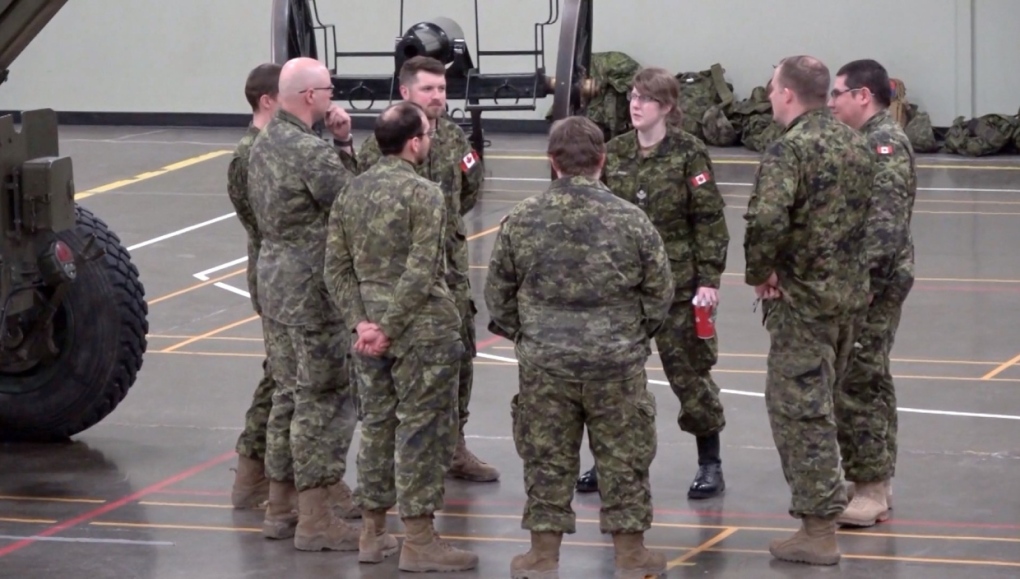Canadian Army highlights benefits of hiring reservists
 Alberta is home to roughly 1,700 members of the Canadian Army reserves.
Alberta is home to roughly 1,700 members of the Canadian Army reserves.
Alberta is home to roughly 1,700 members of the Canadian Army reserves.
Those reservists train several times a month and can be deployed in times of disaster.
"We have nine units spread out across the province, from Medicine Hat, Lethbridge, Calgary, Red Deer and Edmonton," said Col. Christopher Hunt, commander of the Alberta-based 41 Canadian Brigade.
"The army reserve is a part-time professional component of the Canadian Army. Our soldiers serve from their communities."
Because these reservists are part-time, most will need to find other work.
A spokesperson for the Canadian Forces says the training they have received makes reservists leaders in the workplace and ideal candidates for many jobs.
"Reservists are fantastic for employers because they bring very special skills that they obtain in the military, such as leadership," said Carolyn Patton, the Alberta chair for the Canadian Forces Liaison Council.
"What they learn in the workplace they also bring back to the military. So it's a win-win situation."
While some businesses may be hesitant to hire reservists due to the fact they could be called away from work for extended periods of time, the federal government has set up a grant to help cover the costs of temporarily replacing a reservists who has been called away to help alleviate any concerns.
"Sometimes reservists need to deploy and that can be challenging for employers, so what's available is a federal grant and it's called CERP, Compensation for Employers of Reservists Program," Patton said.
"It can help backfill that position while the reservist deploys."
The Canadian Army is also reminding potential employers that reservists do have a say in when and where they're deployed; baring a major conflict or disaster reservists have to volunteer to be deployed.
"For both domestic and expeditionary operations, they're trained up to a certain level of readiness, but they have to volunteer for operations, so it also people to balance with their other civilian and career commitments," Col. Hunt said.
CTVNews.ca Top Stories

5 rescued after avalanche triggered north of Whistler, B.C. RCMP say
Emergency crews and heli-skiing staff helped rescue five people who were caught up in a backcountry avalanche north of Whistler, B.C., on Monday morning.
Quebec fugitive killed in Mexican resort town, RCMP say
RCMP are confirming that a fugitive, Mathieu Belanger, wanted by Quebec provincial police has died in Mexico, in what local media are calling a murder.
Bill Clinton hospitalized with a fever but in good spirits, spokesperson says
Former President Bill Clinton was admitted Monday to Georgetown University Medical Center in Washington after developing a fever.
Trump again calls to buy Greenland after eyeing Canada and the Panama Canal
First it was Canada, then the Panama Canal. Now, Donald Trump again wants Greenland. The president-elect is renewing unsuccessful calls he made during his first term for the U.S. to buy Greenland from Denmark, adding to the list of allied countries with which he's picking fights even before taking office.
UN investigative team says Syria's new authorities 'very receptive' to probe of Assad war crimes
The U.N. organization assisting in investigating the most serious crimes in Syria said Monday the country’s new authorities were “very receptive” to its request for cooperation during a just-concluded visit to Damascus, and it is preparing to deploy.
Pioneering Métis human rights advocate Muriel Stanley Venne dies at 87
Muriel Stanley Venne, a trail-blazing Métis woman known for her Indigenous rights advocacy, has died at 87.
King Charles ends royal warrants for Ben & Jerry's owner Unilever and Cadbury chocolatiers
King Charles III has ended royal warrants for Cadbury and Unilever, which owns brands including Marmite and Ben & Jerry’s, in a blow to the household names.
Man faces murder charges in death of woman who was lit on fire in New York City subway
A man is facing murder charges in New York City for allegedly setting a woman on fire inside a subway train and then watching her die after she was engulfed in flames, police said Monday.
Canada regulator sues Rogers for alleged misleading claims about data offering
Canada's antitrust regulator said on Monday it was suing Rogers Communications Inc, for allegedly misleading consumers about offering unlimited data under some phone plans.

































